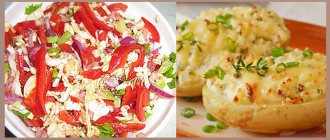Treating the stomach with garlic is one of the most common methods of combating many gastrointestinal ailments. Few people know the true properties of garlic, and in addition to its not entirely pleasant smell, it carries a lot of useful qualities and properties. So is it possible to treat the stomach with garlic? Will such therapy be beneficial? What dosages should be observed? Answers to these and other questions can be found below.
Beneficial features
Both onion and garlic crops are incredibly beneficial. Garlic keeps the entire body healthy.
- It fights Helicobacter pylori;
- Garlic is a powerful antiseptic that disinfects intestinal microflora and destroys all pathogenic microorganisms;
- Experts say that garlic can enhance fat burning processes, and also helps speed up digestion and eliminate bloating;
- The product contains amino acids, ascorbic acid and vitamin D, nicotinic acid, allicin, thanks to which it can increase general organic tone.
Onions are no less beneficial for the body, rich in vitamin components and minerals, which give it a lot of beneficial properties.
- The vegetable has a positive effect on the cardiovascular and endocrine structures of patients;
- Helps normalize digestive activity and also eliminates intestinal fermentation;
- It has antifungal and antimicrobial effects, which are provided thanks to flavonoids and phytoncides in the composition of vegetables;
- Helps strengthen immune status and stabilize metabolic processes.
In general, both garlic and onions have a positive effect on our body, although not everyone can use them with gastrointestinal pathologies. These vegetable crops contain essential oils that increase the secretion of gastric juice.
Garlic
Garlic is as good for the body as onions. Here are its main supporting properties for the body:
- Disinfects the microflora of the intestines and stomach. It is a strong antiseptic and kills almost all types of pathogenic microbes.
- Recent research by scientists has proven that this vegetable is important for the functioning of the heart, strengthens the walls of blood vessels, cleanses the blood, and improves its composition.
- The beneficial effects of its components on blood vessels and the heart help maintain normal blood pressure.
- It is important to include garlic in the diet of athletes - it helps build and strengthen muscles and increases testosterone levels in the blood. Eating this vegetable before training will improve your endurance and strength.
- In its raw form, it helps burn fat and quickly digest food. It is traditionally served with meat dishes in many cuisines around the world.
- Cholesterol levels are reduced.
The patient has difficulty digesting tart, pungent garlic. This causes discomfort, pain in the stomach and intestines, and bloating. Garlic is contraindicated for acute gastritis.
Is it possible to eat garlic with chronic gastritis?
You should consult your doctor about this. First of all, you should determine how intense the secretion of gastric juice is. If there is a strong secretion of juice, garlic is contraindicated, since its burning components will provoke increased secretion of hydrochloric acid. This will lead to inflammation of the mucous membrane of the stomach and esophagus, heartburn, and bloating. In addition to garlic, in this case you should avoid foods that are rich in fiber and have a pungent taste - radishes, radishes, and some varieties of turnips. It is also not recommended to abuse coffee, alcoholic beverages and mushrooms. Fatty, fried, smoked and spicy foods are not allowed.
Patients with low acidity can consume garlic in small quantities (1-2 cloves) infrequently. 30 minutes before your meal, you can drink a glass of mineral water to improve the functioning of your stomach and increase your appetite.
In order not to irritate the walls of a sore stomach, you will have to limit or completely stop eating garlic. This can lead to an attack of gastritis with severe pain, diarrhea and vomiting.
Harm
Although garlic is incredibly healthy, gastritis sufferers should not get carried away with it. With excessive consumption of vegetables, the well-being of patients noticeably worsens. It’s just that garlic fiber is difficult to digest, and excessive stress during gastritis is extremely undesirable and causes exacerbations.
Essential oils and bitterness in garlic irritate the mucous membranes, stimulating additional secretion of gastric juice, which negatively affects their condition.
Even relatively healthy people who do not have gastrointestinal problems can eat no more than 3 cloves per day, otherwise heartburn and pain in the epigastric region may occur.
Fresh onion vegetables are incredibly healthy, but in this form they have an irritating effect on the mucous membranes.
When it is consumed, gastritis sufferers begin active secretion and irritation in the stomach, which leads to pronounced pain, heartburn and discomfort. Therefore, fresh onions and garlic are contraindicated for consumption by gastritis sufferers.
How to use garlic in your diet
Since natural seasoning can be dangerous for the gastric mucosa, if it is covered with ulcers and inflamed, its use, even during a period of remission, must be agreed with a doctor.
In raw and ground form, the product can sometimes be eaten in cases where the ulcer occurs against the background of gastritis with low acidity. In this case, thanks to it, it is possible to eliminate the fermentation processes.
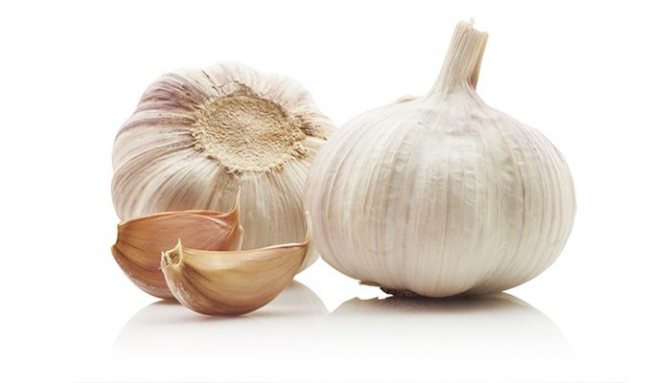
But basically, nutrition for stomach ulcers involves the use of heat-treated garlic. Despite the fact that after this there is a minimum of useful substances left in it, the product significantly improves the taste of dishes.
It is allowed to use cloves when preparing sauces and salad dressings. To do this, pour boiling water or a small amount of hot vegetable oil over them.
After this, the crushed product is added to sauces or salads, significantly improving the taste of dishes. Its use is considered appropriate in the famous “Broom” salad, which helps cleanse the intestines. Its ingredients are:
- Boiled beets.
- Boiled carrots.
- Steamed garlic.
- A little low-fat sour cream.
When can it be used?
It is strictly contraindicated to eat onion and garlic crops in acute gastritis; in such a condition, patients need a strict diet.
For the first day, it is better to refuse food and drink only water. This will help the mucous membranes calm down and unload. When the exacerbation stops, gentle meals in a semi-liquid state begin to be introduced. On the second day you are allowed to drink a weak rosehip decoction or unsweetened tea.
Then water-based porridges, slimy vegetable soups, etc. are introduced. It is strictly unacceptable to season food with hot spices. How to use onions and garlic?
- With chronic gastritis during the remission period, if the patient has high acidity, eating garlic can provoke an exacerbation and even a peptic ulcer.
- If the acidity is low, then a limited amount of garlic will not harm patients, provided that there is no discomfort after consuming it.
- Onion greens are also incredibly beneficial for the body. It contains many vitamins, minerals, essential oils and microelements. But along with them, green feathers also contain components that irritate the mucous membrane. Therefore, after abusing greens, patients experience a burning sensation in the epigastrium.
- You can eat onion greens by pouring a little boiling water over them. Vitamins will be preserved in it, and irritants will be eliminated with boiling water.
- In a similar way, you can process onion vegetables by scalding them with boiled water from a kettle. After such processing, the product is perceived calmly by the digestive system, it does not cause irritation to the gastrointestinal tract, and therefore no longer causes exacerbations.
- But frying the vegetable is not recommended, because fried food is contraindicated for gastritis sufferers.
In general, with proper processing and in limited quantities, vegetables such as onions or green onions and garlic are quite acceptable in the diet of gastritis sufferers.
Can I eat if I have stomach problems or not?
Garlic can increase the level of hydrochloric acid in gastric juice , so in order not to harm the body, it is necessary to take into account the form of the disease.
In remission
In case of stable remission, it is allowed to consume a small amount of the product, provided there are no manifestations of the disease. But it is not recommended to eat garlic raw; it is better to add its cloves to meat or vegetable dishes, as it is possible that the disease may worsen and its symptoms may manifest. In small quantities, it helps normalize the mineral balance in the body.
In chronic form
Chronic gastritis is accompanied by inflammation of the gastric mucosa . In the absence of acute symptoms of the disease, it is allowed to consume a tiny amount of garlic, but not in its pure form.
It is better to add it as a seasoning to your favorite dishes.
Patients with chronic gastritis should be wary of such consequences of overeating this vegetable as:
The ability to eat garlic depends on the level of acidity of gastric juice.
For acute
A strict diet or even therapeutic fasting is indicated for acute forms of the disease . In the first days, it is necessary for the inflamed stomach to calm down; this is facilitated by eating steamed dishes, porridge (preferably oatmeal) and foods without spicy seasonings.
Garlic cloves are difficult to digest in the human body.
Even after the acute pain subsides, it is necessary to adhere to a gentle diet for at least a month, gradually introducing irritating foods into the diet .
Boiled onions and garlic for gastritis with high acidity
Boiled onion vegetables can be used in the preparation of salads, soups or main courses to feed gastritis sufferers.
With short heat treatment, taste changes occur; the onion becomes sweet, soft and loses its aromatic properties. But at the same time, the product does not lose any of its beneficial properties. You don’t have to cook it, but just thoroughly pour boiling water over the onion head and leaves.
As for garlic, gastritis sufferers cannot eat it fresh, but boiled or baked is completely acceptable. Moreover, it is the baked or boiled form that is acceptable for gastritis.
Only a gastroenterologist can allow or prohibit the use of a particular product, because each patient with gastritis has its own contraindications and dietary restrictions. Therefore, to clarify the recommended menu, you should consult your doctor.
Contraindications
Stomach ulcer and garlic are compatible concepts, but only during a period of stable remission. During an exacerbation of the disease, natural seasoning is a prohibited product. It is necessary to consume garlic in small quantities for stomach ulcers.
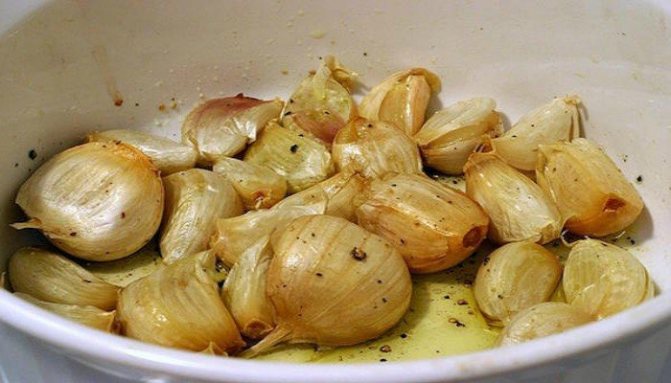
Natural seasoning has the ability to thin the blood. This property is dangerous in the presence of a stomach ulcer. The product may cause bleeding. In addition, you should remember about other contraindications. This product contains sulfates.
If you abuse them, it can cause headaches. A similar reaction can also be observed in case of individual intolerance to the product. People suffering from epileptic seizures should not eat garlic.
Considering the usefulness of garlic and its taste properties, which can improve the taste of dishes, most gastroenterologists allow it to be included in the diet for stomach ulcers. It is important to observe the measure and monitor the body’s individual reactions to the product.
a brief description of
Modern medicine does not stand still, and approaches to treating stomach problems are improving every year. For a relatively long period of time, it was believed that stomach and duodenal ulcers arose due to increased acidity in the organs themselves. In fact, neither stress nor acidity have any effect on the course of the disease. The entire infection, which causes the formation of ulcers, is caused by a special type of bacteria Helicobacter.
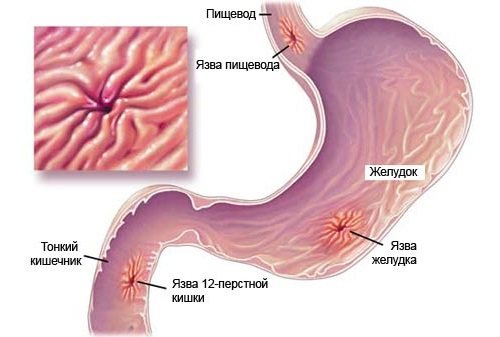
Now, in addition to traditional medications, patients have begun to take special antibiotics to fight the virus. It is worth noting the fact that this bacterium is found not only in the sick, but also in the healthy stomach. And total destruction can only harm the gastrointestinal tract. Therefore, treating the stomach with garlic has become the most important. Some of its qualities are indispensable in the fight against ulcers.
Garlic is a natural antiseptic, which, once in the stomach, begins to fight various infections. It can stimulate digestion and have a disinfectant effect, killing various pathogenic microorganisms. All of these qualities suggest that garlic is a natural antibiotic that has a minimum of contraindications. The Helicobacter bacterium is successfully eliminated by it.
Effect of onions on the stomach
Raw onions should be included in the menu with great caution for various pathologies of the gastrointestinal tract. In most cases, the use of this plant for gastritis is not allowed due to the phytoncides and essential oils it contains in excess. They act aggressively on the inflamed walls of the stomach and intestines, which, moreover, react poorly to rough, fibrous foods.
This is how the secretion of hydrochloric acid is activated above normal from the glands located in the surface layer of the epithelium. This can provoke the appearance of ulcers on the mucous membrane with all the ensuing consequences.
Still, this sharp and piquant vegetable is very useful, but it should not be abused for gastritis with high acidity. Onions increase gas formation, therefore they are also contraindicated for people prone to flatulence in the intestines caused by dysfunction of the digestive system. The exception is cases when gastritis occurs with low acidity without exacerbations.
It is allowed to eat onions if you have a stomach ulcer only in minimal doses and after proper heat treatment.
Rules of consumption
Onions are a food rich in microelements. Therefore, you need to know how to eat it correctly so as not to deprive your body of useful substances and not harm your stomach. Heat treatment is the solution to all problems.
It is in this form that onions can be eaten for gastritis and duodenal ulcers. The main thing is to approach the issue wisely in order to preserve all the healing properties of the product, while eliminating the risk of irritation.
Fried onions are strictly prohibited for any form of gastritis and its ulcerative manifestations. It's no secret that fried foods contain carcinogens and harmful fats, whose effect on the body is detrimental. Pickled and canned onions are also prohibited, in principle, as are any products prepared in this form.
In order to remove the bitterness and sharp taste of the vegetable, just cut it and pour boiling water over it.
Boiled method
Boiled onions for gastritis are allowed, however, as are baked and stewed ones. It is believed that this is the most gentle processing of this vegetable, which makes your dish tastier, more nutritious and healthier. Boiled onions increase appetite, improve digestion and protect against ulcers.
The product in this form can be a good alternative to fried and raw onions. With its help you can improve the taste of first, meat and fish dishes. For example, during cooking, you can add finely chopped onions to the dietary broth, which will have time to cook by the end of cooking and give the dish a unique rich taste.
Baked onion
In this form it is eaten, added to salads and cold appetizers. Another recipe is to bake onions in the oven in low-fat milk or sour cream sauce. This gravy is suitable for any porridge. A variety of recipes allow you to prepare unusual dishes that will surprise even the most sophisticated gourmets.
You can also steam peeled onions for a few minutes, then remove the core, fill with lean minced meat, such as rabbit or chicken, and bake in the oven until tender.
Onion jam
Have you heard of this? Onion jam is an original and healthy dish that will be a wonderful addition to the table. In addition, jam has a beneficial effect on the patient’s condition with gastritis and ulcers. The best sweetener for this jam is honey. Of course, you can add sugar here, but honey is still healthier.
There are different options for preparing this dessert. It is important to remember that if you have a sick stomach and intestines, wine, spices and seasonings, which are often added to jam, are contraindicated. This is done in order to give the dessert a special taste. But, unfortunately, such a recipe does not suit us, so we offer you a recipe for “gentle” onion jam:
- For 1 kg. You will need 1 kg of onion. honey or sugar.
- All ingredients are ground in a meat grinder or blender.
- The mixture is boiled for 40 minutes. over low heat until it reaches a soft consistency.
- Store onion dessert in the refrigerator
In general, onions and garlic for gastritis can be included in the diet menu, but only if certain rules are followed. Firstly, the products must undergo heat treatment, and secondly, they can only be consumed in small quantities and in the absence of signs of exacerbation of the disease.
How to use?
Treatment must be competent, without exaggeration.
The presented product can be included in your diet. It can be eaten raw or added to various dishes. If the smell bothers you, then you can safely swallow a clove of garlic.
This method of use is not entirely effective, since its breakdown will begin not in the stomach, but in the intestines itself. Patients suffering from stomach ulcers are often prescribed to take garlic pills along with their first meals.
A clove of garlic can be finely chopped and added to the prepared soup. The main thing is to remember that when cooked, garlic loses its beneficial properties. It must be added at the last moment, just before serving. Adding a vegetable to a dish will increase your appetite.
Cabbage juice is very helpful in treating stomach problems. You can mix it with garlic juice, thereby enhancing the beneficial effect. For this you will need half a glass of cabbage juice and 1 tablespoon of garlic juice. It is advisable to take the resulting drink no more than 2 times during the day.
If the pain is not too severe, then you can try the following method: grind three cloves of garlic until a paste forms, add half a teaspoon of salt, and pour boiling water over everything. The resulting broth must be infused for an hour until it reaches room temperature. It is advisable to consume 3 times a day, 1/3 cup. After three days you need to take a break.
In most cases, one course helps reduce pain, but if the desired effect does not occur, the course can be repeated. Treating the stomach with garlic can also lead to changes in intestinal function.
Stomach problems can cause intestinal problems. Many people suffer from constipation. Some people use special laxatives, and soon they become addicted to them. Under no circumstances should you abuse medications. Regulating bowel function is quite simple. It is enough to drink more water, eat vegetables and fruits containing fiber, and move a lot.
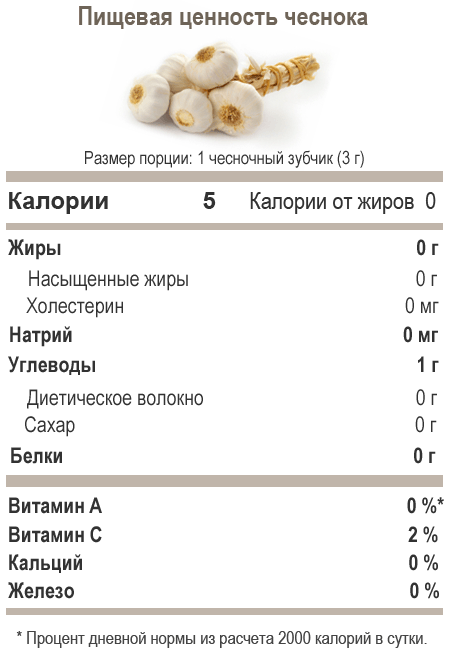
Garlic is not a laxative, but it can have an effect on the underlying causes - a violation of the gastrointestinal microflora or poor digestion. The main thing is to change your usual daily routine and adapt the above recommendations to it. You can conduct a course of treatment with garlic.
To do this, you need to eat 5-7 cloves of garlic for 6-7 days. They can simply be chewed, crushed, mixed with water or carrot juice. If the desired effect is observed, then you can temporarily stop treating the stomach with garlic.
For prevention, you can continue to eat the vegetable, one clove at a time, for 3 months. The clinical picture should change for the better.
It is necessary to highlight such unpleasant diseases as dysentery and diarrhea. They are caused by pathogens that enter the body with food. Similar problems can affect anyone. Unfamiliar or less than clean foods can carry a number of bacteria that, when released into the bloodstream, cause diarrhea. As a preventive measure, you can add a few cloves of garlic to your diet. It will prevent these unwanted problems from developing.
The presented vegetable copes perfectly with the functions assigned to it. It provides reliable protection for the body and has a fairly mild antiseptic effect. It has no special contraindications, which is why it has become so popular.



